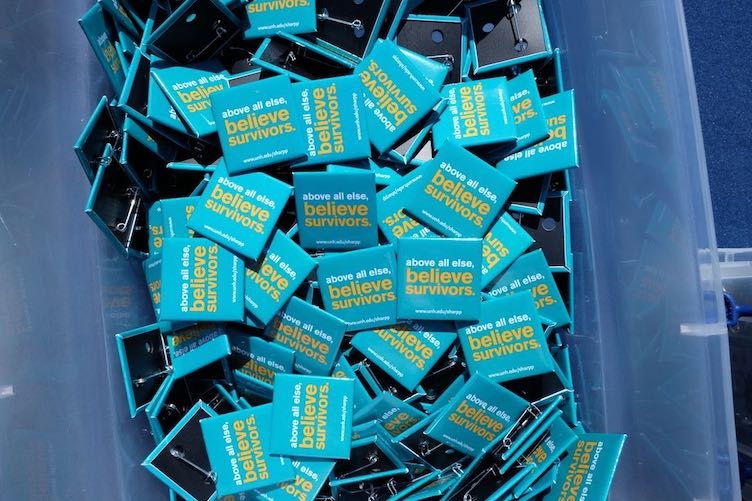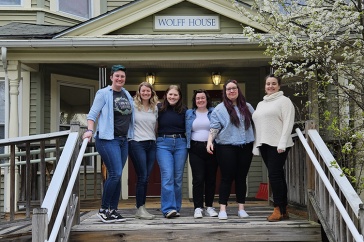
Hi Wildcats!
I hope everyone is enjoying their spring semester so far! The spring semester is particularly important at SHARPP because Sexual Assault Awareness Month (SAAM) is observed in April. Let’s talk about what SAAM is all about. It focuses on educating and raising awareness around sexual violence, as well as supporting, amplifying and uplifting survivors of interpersonal violence. Sexual violence (SV) shows up in many different forms throughout our society. The New Hampshire Coalition Against Domestic & Sexual Violence (NHCADSV) defines sexual assault as "forced, manipulated, or coerced sexual activity. Where sex [is used] to inflict humiliation on the victim, to exert power and control over the victim, or to use the victim to attain sexual gratification without regard for the victim’s consent." (2022).
- It is important to recognize that SV can include harassment, happen in-person or online and can impact anyone regardless of age, race, gender, socioeconomic status, ability, sexuality, ethnicity and more.
- While sexual assault can take many different forms, the loss of power and control that a victim expresses is a common thread.
- In more than half of all reported rapes, the victim and rapist know each other.
When learning about SV it's also so important to continue discussing, addressing misinformation around and spreading education about consent. If you would like to learn more about consent, here is your opportunity! Consent is a mutual agreement, based on a shared desire for something to take place. It is mutual permission between one or more individuals that is ongoing and includes clear and shared communication around what will transpire. Communication can be non-verbal or verbal but should be clear.
Consent should be:
- Taken one step at a time.
- An expressed and honest yes.
- Where each partner remains open to and respects the other partner’s expression of agreement or disagreement to engage in the activity.
An easy way to remember what consent is, created by Planned Parenthood, is the acronym FRIES.
FRIES refers to consent being:
- Freely given: Doing something sexual with someone is a decision that should be made without pressure, force, manipulation or while drunk or high.
- Reversible: Anyone can change their mind about what they want to do at any time, even if you have done it before or are in the middle of having sex.
- Informed: For example, if someone says they’ll use a condom and then they don’t, that’s not consent.
- Enthusiastic: If someone isn’t excited, or really into it, that’s not consent.
- Specific: Saying yes to one thing (like going to the bedroom to make out) doesn’t mean they’ve said yes to others (like oral sex).
Learn more on the Planned Parenthood website.
What does consent NOT mean, you may ask? Consent does not mean “maybe,” “I don’t know,” “I don’t feel like it right now,” and most evidently, “No.” Silence is also not a consensual answer. Consent is not coerced or pressured via the use of power. Asking for consent does not have to be awkward or feel weird. But if asking for sexual acts is too embarrassing or awkward for you or you just can’t imagine doing that, then you probably should not be having sex.
It is important that when seeking consent from someone you are:
- Clear about your desires and expectations.
- Asking permission to engage in specific, named sexual behavior, whether or not you were the one initiating sexual contact.
- Asking for permission each time you wish to progress to new, different, or more intimate sexual behavior.
- Always asking when you are not sure what the other person is telling you.
When receiving consent from someone, it should be very clear and enthusiastic that they want it. A complicated part of consent is when alcohol and/or drugs are involved. On a college campus, one may be introduced to different social settings and situations, including hookup culture and partying. Hookup culture and partying together may lead to someone not being sober enough to give consent to engaging in sexual behavior. A sobering fact of the college experience is that one in five female students will be a victim of sexual assault. Although it happens less often, male students are victims of this crime, too. But alcohol and/or drugs are not the cause of sexual assault. The person committing sexual assault is the cause, and they may use alcohol and/or drugs as a tool to commit the assault. If one is incapacitated by alcohol or drugs, they cannot give consent. If someone has sex with someone who is incapacitated, that is sexual assault. It is a violation of the UNH sexual misconduct policy and is illegal under the New Hampshire law. But what if you want to drink and have sex? Just remember that the New Hampshire legal drinking age is 21, and age of consent is 16. If you are drunk and you perform a sexual act on another drunk person, you are responsible for your behavior. Always err on the side of caution when asking if someone is sober enough to give consent to engaging in sexual activities. Learn more about low risk drinking here.
In closing, sexual assault can happen to anyone regardless of gender, age, ability, sexual orientation, gender identity, socio-economic status or race. If you have been sexually assaulted, SHARPP is available to help. We are 100% free and confidential. If you walk through our doors, no one ever has to know that you did. No information you give us will be shared with anybody unless you give us a written release to do so and would like to take that course of action (i.e. medical accompaniment, police, Title IX, etc.) We can help you every step of the way with the support you decide is best for you! SHARPP advocates are available 24 hours a day, 365 days a year. You can call our 24-hour support line at (603) 862-7233 (SAFE), or visit us at our office, Monday-Friday, 8 a.m.-4:30 p.m. at Wolff House (next to Health and Wellness).
For more information regarding sexual violence and SAAM, check out these links:
Take care of yourself and each other, Wildcats! See you next blog post!
-
Written By:
Ava Courduvelis | SHARPP Student Marketing and Communications Assistant














































